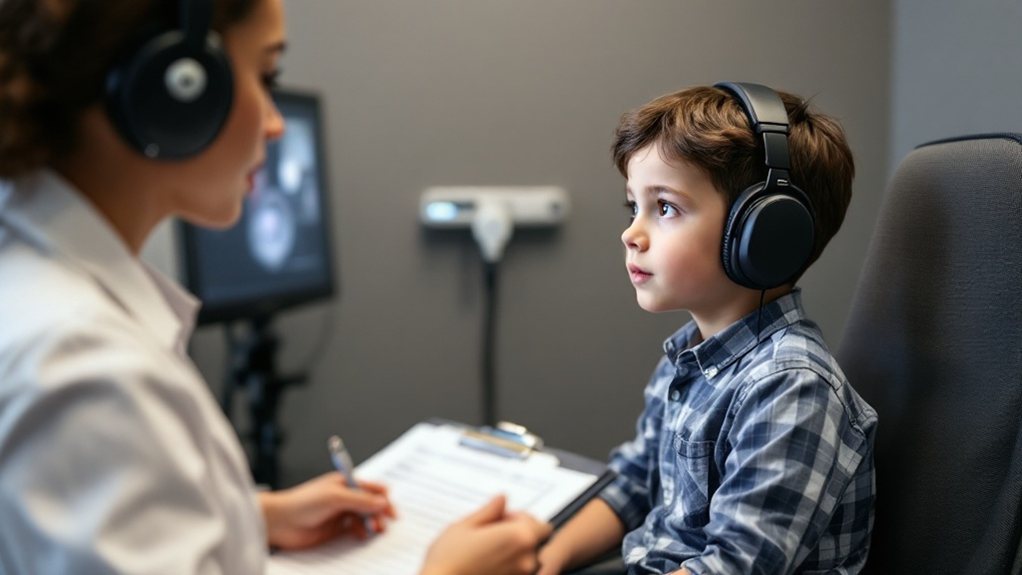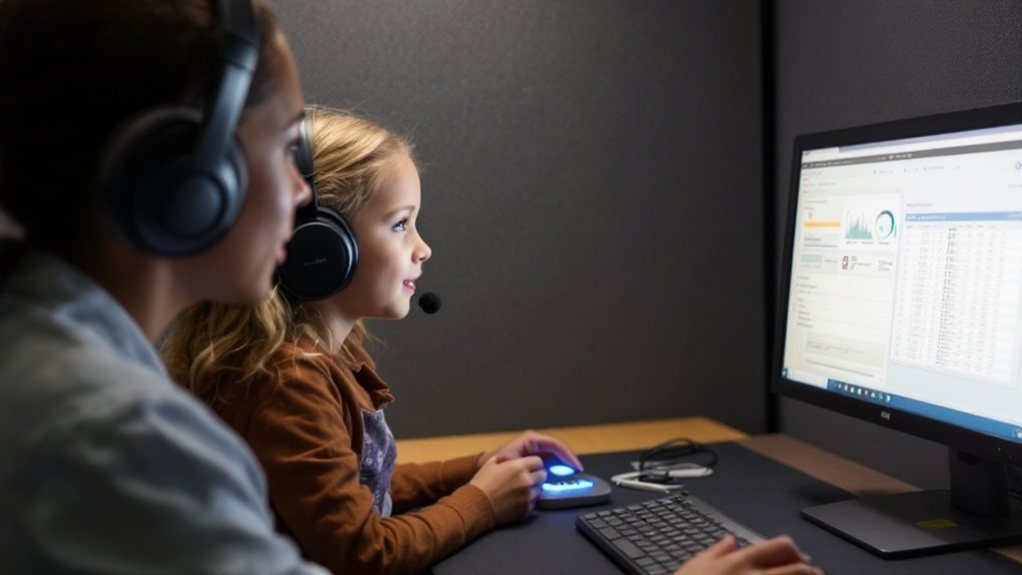Are you looking for Children Hearing Test North Maclean?
Ready to take the first step towards better hearing?
Let’s talk!
Connect with us today! Fill out the contact form below to schedule your personalised hearing consultation at All Things Hearing. Our expert team is committed to guiding you on your journey to improved hearing health. Don't wait to enhance your quality of life. Reach out now – we're here to listen and help!
Follow us:
Our main hearing clinic is located in Greenbank and our visiting sites are located in Daisy Hill, Jimboomba, Parkinson, and Wishart. You’re considering a hearing test for your child, which is great. It’s crucial for identifying issues that can impact their development.
At All Things Hearing, we provide our hearing services in the area, and we offer various test types, like pure-tone audiometry and otoacoustic emissions. Your child’s age and needs will determine the suitable test. You’ll want to know what to expect during the test, and how to prepare them.
As you explore further, you’ll discover more about the importance of early testing and how it can make a big difference in your child’s hearing health and overall well-being. You’re about to uncover more key information.
Types of Hearing Tests
When you’re considering a children’s hearing test, it’s essential to know there are several types to choose from. You’ll want to choose a test that’s suitable for your child’s age and needs. For instance, pure-tone audiometry is a common test that measures your child’s ability to hear different frequencies. It’s usually used for kids who are old enough to respond to sounds.
You may also consider an otoacoustic emissions test, which doesn’t require your child to respond to sounds. It’s often used for infants and young children. Another option is a tympanometry test, which checks the middle ear’s function. It’s helpful in identifying issues like fluid buildup or eustachian tube problems. When you’re discussing test options with your child’s doctor, don’t hesitate to ask about the different types and which one is best for your child. You should also ask about what to expect during the test and how to prepare your child.
Why Test Children Early
Identifying hearing issues early on is crucial for your child’s development, as it can significantly impact their ability to learn and communicate. You want to ensure your child doesn’t fall behind in school or struggle to make friends due to hearing problems. Early testing can help you identify any issues and take corrective action. It’s essential to remember that hearing plays a critical role in language development, and any delays can affect your child’s ability to speak and understand language.
You should test your child early to prevent potential developmental delays. If you don’t, it can lead to difficulties in school and social situations. By testing early, you can provide your child with the necessary support and resources to overcome any hearing issues. It’s also important to note that early intervention can significantly improve treatment outcomes. You’ll be able to work with your child’s healthcare provider to develop a plan that addresses their specific needs, ensuring they receive the best possible care. This can make a significant difference in their overall development and well-being.
Signs of Hearing Problems

Someone may notice that their child doesn’t respond to sounds or their name, which can be a sign of a hearing problem. You might see that your child doesn’t turn their head when you call them or when a loud noise is made. They might not react to music or other sounds that typically get a child’s attention. If you’re concerned, it’s essential to pay attention to your child’s behavior and watch for other signs, such as delayed speech or language development.
You should also look out for difficulties with balance or coordination, as these can be related to hearing issues. If your child is having trouble in school or seems to be struggling to follow instructions, it could be due to a hearing problem. You’ll want to keep an eye on your child’s behavior and take note of any changes or concerns you have. It’s crucial to address potential hearing problems early on to ensure your child receives the support they need.
Hearing Test Procedures
A child’s hearing test typically involves a series of evaluations designed to assess their ability to detect sounds. You’ll be asked to accompany your child to the test, where they’ll be introduced to the audiologist or hearing specialist. The specialist will explain the procedures to you and your child, making sure you’re both comfortable with what’s about to happen.
You’ll notice the specialist using various tools, such as headphones or earphones, to play sounds of different frequencies and volumes. Your child will be asked to respond when they hear a sound, which helps the specialist determine their hearing threshold. The test may also include speech recognition evaluations, where your child will be asked to repeat words or phrases they hear. It’s essential you stay calm and supportive throughout the process, as this will help your child feel at ease. By following the specialist’s instructions, you’ll be helping your child get an accurate hearing assessment.
Age Related Hearing Loss

Hearing ability can decline with time, and you’ll likely notice it’s more common in older adults, but it can also affect children. You might’ve seen it in your family or friends, where it seems like they’re having trouble hearing. It’s essential to understand that age-related hearing loss can occur due to various factors, including genetics, exposure to loud noises, or certain medical conditions.
As you consider your child’s hearing, it’s crucial to recognize that age-related hearing loss can be a gradual process. You won’t necessarily notice it overnight, but rather over time. It’s not just about the volume, either – you might find that your child is having trouble distinguishing between different sounds or understanding speech in noisy environments. You should be aware of the signs and symptoms, such as difficulty hearing high-pitched sounds or following conversations. If you suspect your child is experiencing age-related hearing loss, it’s vital to consult a healthcare professional for proper evaluation and guidance. They can help you determine the best course of action to address your child’s hearing needs.
Common Hearing Issues
Because you’re concerned about your child’s hearing, it’s essential to know that common hearing issues can affect kids of all ages. You should be aware that hearing problems can be temporary or permanent, and they might be present at birth or develop later in life. Some common issues include otitis media, which is an ear infection that can cause fluid buildup and hearing loss. You might notice that your child can’t hear you when you’re calling them, or they’re having trouble understanding speech in noisy environments.
You’ll want to keep an eye out for signs of hearing issues, such as delayed speech development or difficulty responding to sounds. If you suspect your child has a hearing problem, it’s crucial that you get them tested as soon as possible. You can schedule a hearing test with an audiologist or an ear, nose, and throat specialist. They’ll assess your child’s hearing and provide you with an accurate diagnosis. By being proactive, you can help identify any potential issues and ensure your child receives the necessary care. This will help you understand what’s going on with your child’s hearing.
Treatment Options Available
With your child’s diagnosis in hand, you’ll want to discuss treatment options with their doctor. You’ll need to know what’s available for your child’s specific condition. Your doctor will help you understand the pros and cons of each option. They’ll also explain what you can expect during treatment.
You may be considering devices like hearing aids or cochlear implants. These can significantly improve your child’s ability to hear and communicate. You’ll need to learn how to properly use and maintain these devices. Your doctor will show you how to put them in, take them out, and clean them. They’ll also recommend any follow-up appointments or tests. It’s essential to follow their advice to ensure your child gets the best possible care. You’ll want to ask questions and understand the treatment plan thoroughly. This will help you make informed decisions about your child’s care and ensure they receive the support they need.
Preventing Hearing Damage
Now that you’ve explored treatment options for your child’s hearing condition, it’s time to think about how to protect their hearing in the future. You’ll want to take steps to prevent further hearing damage, which can be caused by loud noises, ear infections, or certain medications. It’s essential to monitor the volume levels when your child is listening to music or watching TV, and you should encourage them to wear ear protection when attending loud events.
You can also take preventive measures by ensuring your child gets regular check-ups with an audiologist or ear, nose, and throat specialist. They can check for any signs of hearing damage or other conditions that may affect their hearing. Additionally, you should teach your child good ear hygiene habits, such as avoiding putting objects in their ears and drying their ears thoroughly after bathing or swimming. By taking these steps, you can help protect your child’s hearing and reduce the risk of further damage. This will help them maintain good hearing health for years to come.
Disclaimer
The content on our site is purely for education and should not be seen as an endorsement or recommendation of any treatments or products without a thorough hearing assessment and evaluation. Before starting any treatment, users should get advice from a professional and be fully aware of any potential side effects or risks related to the procedures. Any products we mention cannot be purchased by the public without first consulting a hearing health expert.
